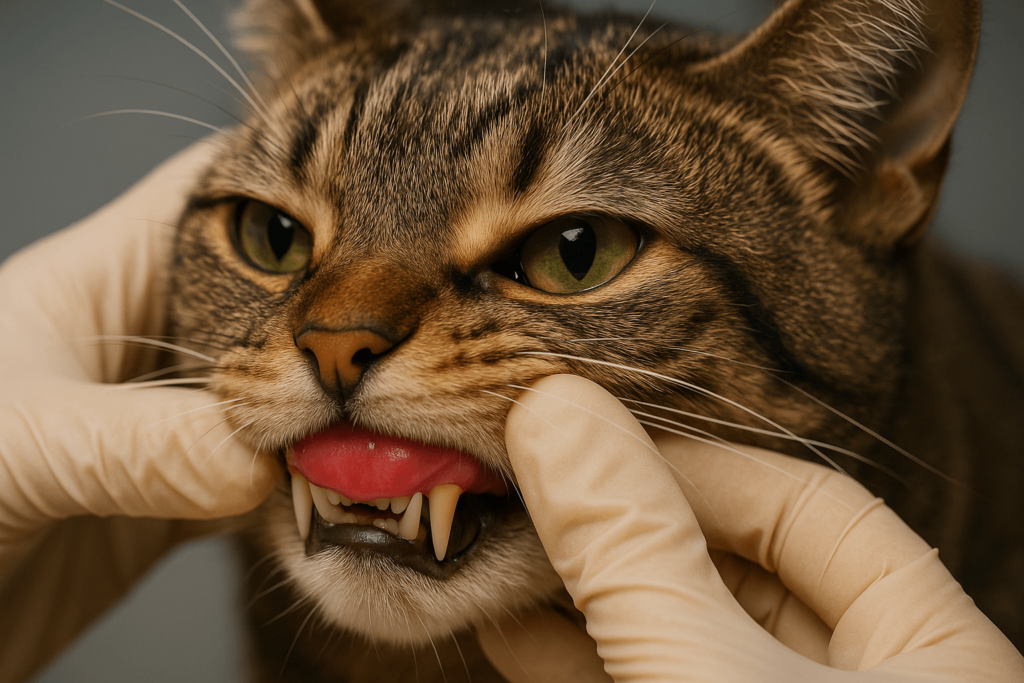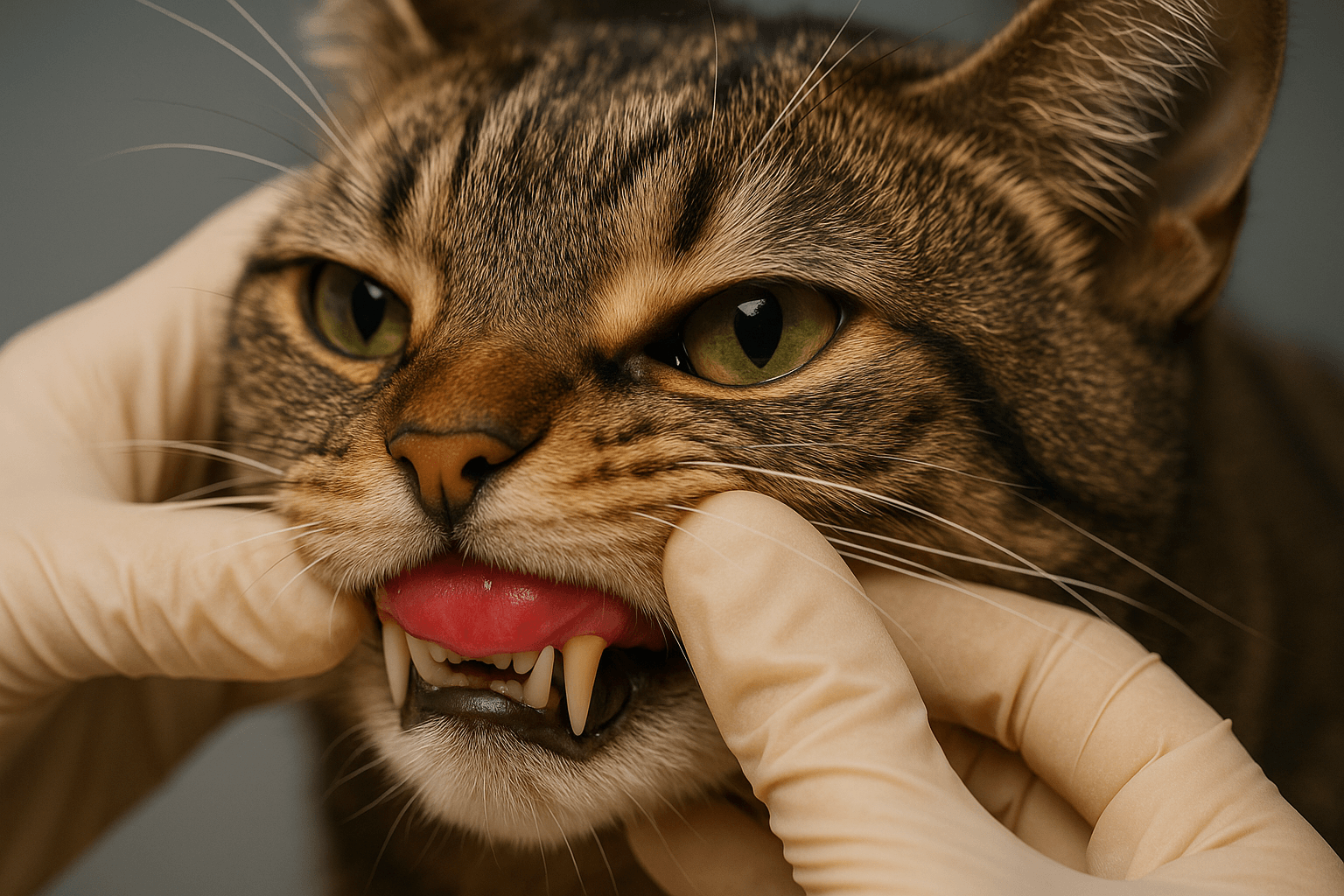Cat Swollen Gums: Causes, Symptoms, and Treatment Options
Swollen gums in cats can be a sign of underlying health issues that require prompt attention. While it may seem like a minor problem, inflamed gums can lead to discomfort, difficulty eating, and even more serious conditions if left untreated. Understanding the causes, recognizing the symptoms, and knowing how to address this issue are essential for ensuring your feline friend’s well-being. In this guide, we’ll explore everything you need to know about cat swollen gums, from prevention to treatment, so you can keep your pet healthy and happy.
Common Causes of Swollen Gums in Cats
Swollen gums in cats can stem from a variety of factors, ranging from infections to dietary issues. Identifying the root cause is the first step toward effective treatment.
Dental Disease:
Periodontal disease and gingivitis are common culprits, often caused by plaque buildup and bacterial infections.Viral Infections:
Feline calicivirus and feline immunodeficiency virus (FIV) can lead to gum inflammation and other oral health problems.Poor Oral Hygiene:
A lack of regular dental care can result in tartar accumulation, which irritates the gums and causes swelling.Allergic Reactions:
Some cats may develop swollen gums due to allergies to food or environmental triggers.Trauma or Injury:
Chewing on hard objects or accidental bites can damage the gums, leading to inflammation.
By understanding these potential causes, you can better assess your cat’s condition and seek appropriate veterinary care.

Signs and Symptoms to Watch For
Recognizing the signs of swollen gums early can help prevent complications and ensure timely treatment. Here are some common symptoms to look out for.
Red or Bleeding Gums:
Inflamed gums often appear redder than usual and may bleed during brushing or eating.Bad Breath:
Persistent halitosis can indicate an underlying dental issue, including gum inflammation.Difficulty Eating:
Cats with swollen gums may avoid hard food or show reluctance to eat altogether.Excessive Drooling:
Increased saliva production is a common symptom of oral discomfort or pain.Pawing at the Mouth:
If your cat frequently paws at their mouth or face, it could signal irritation or swelling.
Observing these symptoms closely allows you to act quickly and prevent further complications.
Check this guide 👉Anemic Cat Gums vs Normal: Best 7 Expert Tips!
Check this guide 👉Red Gums in Cats: Best 7 Health Tips!
Check this guide 👉Red Gums in Cats: Best 7 Health Tips!
Preventive Measures for Healthy Gums | Treatment Options for Swollen Gums |
|---|---|
Regular teeth brushing with cat-safe toothpaste | Professional dental cleaning by a vet |
Providing dental-friendly toys and treats | Antibiotics for bacterial infections |
Scheduling annual veterinary check-ups | Anti-inflammatory medications for pain |
Feeding a balanced, nutrient-rich diet | Tooth extractions for severe cases |
Avoiding hard objects that can injure gums | Addressing underlying viral conditions |
How to Care for Your Cat’s Oral Health at Home
Maintaining your cat’s oral hygiene is crucial for preventing swollen gums and other dental issues. These tips will help you establish a routine that promotes long-term oral health.
Brush Their Teeth Regularly:
Use a soft-bristled toothbrush and enzymatic toothpaste designed for cats. Aim to brush their teeth 2-3 times a week.Offer Dental Treats:
Dental chews and treats can help reduce plaque and tartar buildup while keeping your cat entertained.Incorporate Water Additives:
Specialized water additives can combat bacteria in your cat’s mouth, promoting fresher breath and healthier gums.Monitor Their Diet:
Feed high-quality, wet, or dry food that supports dental health and avoids excessive carbohydrates.Inspect Their Mouth Weekly:
Regularly check your cat’s gums and teeth for signs of redness, swelling, or unusual odors.
A proactive approach to oral care can significantly reduce the risk of swollen gums and related complications.
When to Visit the Veterinarian
While home care is important, certain situations require immediate veterinary attention. Knowing when to consult a professional ensures your cat receives the care they need.
Persistent Swelling:
If the swelling doesn’t improve within a few days, it’s time to see a vet.Loss of Appetite:
Refusal to eat or drink indicates significant discomfort and warrants a check-up.Visible Pus or Discharge:
Pus around the gums or teeth can signal an infection that needs treatment.Unexplained Weight Loss:
Sudden weight loss alongside swollen gums may point to a systemic issue.Behavioral Changes:
Increased irritability, lethargy, or hiding can indicate pain or illness.
Timely intervention by a veterinarian can prevent minor issues from escalating into major health concerns.
Preventing Gum Disease Through Diet
Your cat’s diet plays a crucial role in maintaining healthy gums and preventing inflammation. Here are some dietary strategies to consider.
Wet Food Over Dry Kibble:
Wet food is gentler on gums and reduces the risk of irritation compared to hard kibble.Limited Carbohydrates:
High-carb diets can contribute to plaque buildup, so opt for protein-rich options instead.Supplements for Oral Health:
Omega-3 fatty acids and probiotics can support gum health and reduce inflammation.Hydration is Key:
Ensure your cat drinks enough water to maintain saliva production, which helps wash away bacteria.Avoid Sugary Treats:
Sugary snacks can promote bacterial growth and worsen gum conditions.
A balanced diet tailored to your cat’s needs can go a long way in preventing gum disease.
Alternative Remedies for Mild Gum Inflammation
For mild cases of swollen gums, alternative remedies may provide relief. However, always consult your vet before trying new treatments.
Coconut Oil Rubs:
Applying a small amount of coconut oil to the gums can soothe irritation due to its antibacterial properties.Herbal Mouth Rinses:
Diluted chamomile or calendula rinses can reduce inflammation and promote healing.Cold Compresses:
Gently applying a cold compress to the outside of your cat’s mouth can reduce swelling.Probiotic Supplements:
Probiotics help balance oral bacteria, potentially reducing gum inflammation over time.Homemade Broth:
Warm, low-sodium broth can encourage hydration and provide comfort during meals.
These remedies offer natural ways to support your cat’s recovery while complementing professional care.
Long-Term Strategies for Gum Health
Maintaining your cat’s gum health requires ongoing effort and commitment. These long-term strategies can help keep their gums strong and healthy.
Annual Dental Exams:
Schedule regular check-ups with your vet to catch potential issues early.Consistent Oral Hygiene Routine:
Stick to a consistent teeth-brushing schedule to prevent plaque buildup.Environmental Enrichment:
Provide toys and activities that encourage chewing, which naturally cleans teeth.Monitor Stress Levels:
Stress can weaken the immune system, making cats more susceptible to gum issues.Educate Yourself on Feline Health:
Stay informed about common feline health problems to recognize symptoms early.
With dedication and care, you can safeguard your cat’s gums and ensure a lifetime of vibrant health.
Frequently Asked Questions About Cat Swollen Gums
Can I treat my cat’s swollen gums at home?
Mild cases can be managed with home care, but persistent or severe swelling requires veterinary attention.
What foods should I avoid if my cat has swollen gums?
Avoid hard kibble, sticky treats, or foods high in sugar that can exacerbate gum irritation.
How often should I clean my cat’s teeth?
Aim to brush your cat’s teeth 2-3 times a week for optimal oral health.
Is swollen gums a sign of a serious illness?
It can be, especially if caused by viral infections or systemic diseases. A vet can provide a proper diagnosis.
Can swollen gums affect my cat’s overall health?
Yes, untreated gum issues can lead to infections spreading to other parts of the body, impacting overall well-being.
Prioritizing Your Cat’s Oral Health for a Happy Life
Swollen gums in cats may seem like a minor issue, but it can have far-reaching effects on their comfort and health. By staying vigilant, practicing preventive care, and seeking professional help when needed, you can protect your cat from unnecessary pain and complications. Remember, a healthy mouth is the gateway to a healthy body—so take the time to care for your feline companion’s oral hygiene today. With love, attention, and proper care, you can ensure your cat enjoys a lifetime of purrs and playful moments.
Cat Anaphylactic Shock Treatment Costs: Best 7 Expert Tips! – Learn about costs, treatments, and financial aid options to save your cat’s life.
Exocrine Pancreatic Insufficiency in Cats: Best 7 Tips! – Learn to spot symptoms, manage EPI effectively, and improve your cat’s quality of life with expert advice.
Cost of Dog Anaphylactic Shock Treatment: Best 7 Tips! – Learn about emergency costs, financial planning, and ways to manage expenses for your dog’s care.
Exocrine Pancreatic Insufficiency in Dogs: Best 7 Tips! – Learn to spot symptoms, manage EPI effectively, and improve your dog’s quality of life with expert guidance.





